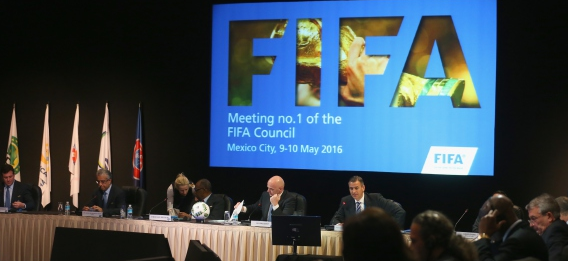By Andrew Warshaw
May 11 – The 2026 World Cup hosts will not be chosen until May 2020, three years later than originally scheduled, as FIFA beefs up eligibility rules.
With football’s corruption scandal far from resolved and a Swiss probe surrounding the awarding of the 2018 and 2022 tournaments to Russia and Qatar still ongoing, FIFA has decided to push back the 2026 vote, originally due in Kuala Lumpur in 2017, and subject bidding countries to stringent new checks.
A statement following the first meeting of FIFA’s newly established ruling Council, which has replaced the executive committee, said a decision would be made in October which confederations can put bids forward, with the current rules only excluding the Asian Football Confederation because Qatar will have hosted the previous World Cup. It is generally assumed that 2026 will be CONCACAF’s turn for the first time since 1994, with United States, Canada and Mexico all interested parties.
The Council, which met ahead of Friday’s FIFA Congress, also decided that by October there should be a decision on whether to expand the World Cup from 32 to 40 teams in 2026, part of Gianni Infantino’s presidential election manifesto.
With Africa, South America, Europe and Asia hosting the World Cups before 2026, a FIFA statement said there would be a review on whether to allow joint bids and the “eligibility of confederations.”
Outlining a four-phase bidding process, the Council laid out the plans as follows:
- A consultation phase that will run until May 2017;
- An “enhanced phase for bid preparation” between June 2017 and December 2018;
- A bid evaluation between January 2019 and February 2020;
- The vote in May 2020.
One of the conditions outlined by FIFA will be that candidates must meet strict new human rights regulations. The consultation phase will firm up rules that will see bidders excluded if they do not meet “technical requirements”.
For the first time ever the hosts will be decided not by an all-powerful elite few but by the entire FIFA membership based on a shortlist drawn up by the Council.
Joint bids were effectively banned in 2011 but Infantino has brought them back into play and has even encouraged allowing several countries from entire regions to host the tournament.
Meanwhile, FIFA said applications for membership from both Gibraltar and Kosovo would be submitted to the Congress on Friday and that both would be allowed to take part in the 2018 World Cup qualifying competition if accepted.
A potentially divisive vote will also be taken whether to rubberstamp the controversial suspensions of Kuwait and Indonesia – as well as that of Benin.
Contact the writer of this story at moc.l1745018158labto1745018158ofdlr1745018158owedi1745018158sni@w1745018158ahsra1745018158w.wer1745018158dna1745018158

